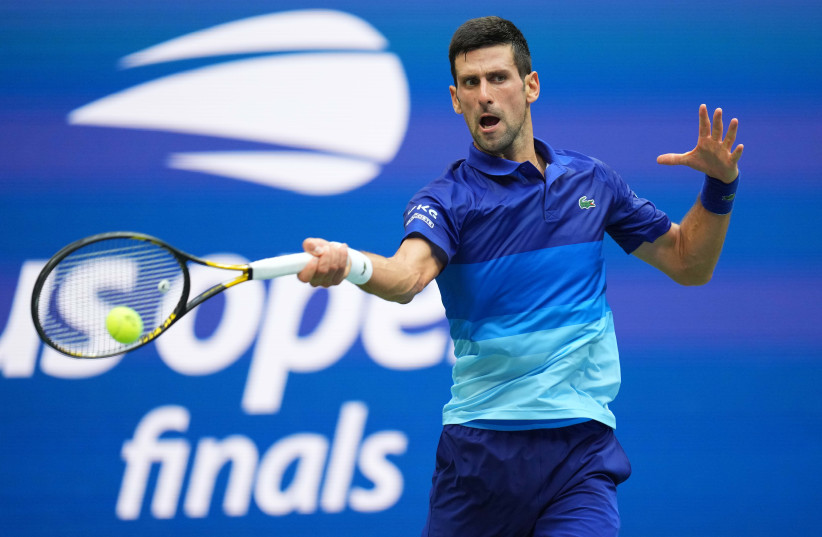On the same day that tennis greats Coco Gauff and Novak Djokovic were battling it out against opponents in Arthur Ashe Stadium at the US Open, other tennis greats, including Alfie Hewitt, Diede De Groot, Niels Vink, David Wagner and Israeli Guy Sasson were competing fiercely on Courts 4, 5 and 6.
These lesser-known, but similarly talented and determined, athletes competed in the expanded wheelchairs tennis events at this year’s US Open Tennis Championships. Many tennis fans and sports fans in general are unfamiliar with this highly competitive event.
Wheelchair tennis has been a part of all four Grand Slams since 2007, and at the Summer Paralympics. There are two divisions – open and quads. Quads is for players who use wheelchairs and also have loss of function in at least one upper limb.
Israel’s only tennis player in any main draw event at this year’s US Open, Guy Sasson, was recently reclassified and participated in the mens’ singles and doubles quads division. Sasson spoke with The Jerusalem Post in the media garden at the US Open following what appeared to be an easy 55-minute first-round win where defeated Tomas Masaryk of Slovakia 6-1, 6-2.
The 43-year-old Sasson shared the very emotional experience of playing on such a big stage as equals with such tennis greats as US Open finalists Djokovic and Danil Medvedev.

“It may have looked easy but it wasn’t! This is the biggest tournament I’ve ever been in. This tournament is different since we are involved with able-bodied tennis players and they treat us as equals with the able-bodied players. We are in the same locker room. You sit in the locker room and Djokovic is coming your way and says, ‘hi, how are you doing? How did you do today?’ Or Medvedev says, ‘sorry I am in your way. Or [Frances] Tiafoe – I almost ran over Tiafoe with my wheelchair.”
Sasson was also impressed with the organization of the tournament and stressed the incredible feeling of being included as equals with world-class pros.
“The chance to do it altogether with the able-bodied – keeping in mind that there are 50,000 people inside watching – even if they are not here to watch me – is incredible.”
A long journey
It has been a long journey for Sasson who grew up non-disabled and became a reluctant wheelchair tennis player. Sasson grew up in Ramat Gan, served in the IDF, traveled after his army service and attended the University of Michigan for college. While in the US, Sasson started and sold several businesses. He returned to Israel, married Aya Mohr, and founded a real estate company.
In 2015, the father of two young children at the time, went snowboarding in France.
“I didn’t see the cliff. I fell off the cliff and hurt my spine,” Sasson recounts. “They flew me to Tel Hashomer Hospital in Israel, I had a big surgery on my spine and hand, and the doctors told me I won’t walk again. It didn’t sound real. Of course I will — I’ll be out of here in two weeks. It turns out, I was in a rehab hospital at Tel Hashomer for one year and did walk out – with braces and canes.
Sasson knew he would need to find something to keep physically active.
“I promised my kids I would get out of the chair,” said Sasson. His initial choice was swimming.
When Sasson viewed tennis, he met a new Israeli coach, Ofri Lankri, an Israeli professional tennis player who played on Israel’s 2014 Fed Cup team. Sasson began to quietly consider it.
The two hit it off and Sasson’s love for wheelchair tennis began to blossom.
“At first, I didn’t tell anyone – not even my wife. No one! When I started to get better, I had to tell my wife!”
Lakri, who coached Sasson during all of his US Open matches, feels similarly connected to Sasson. She is proud of his progress and has high hopes for his future.
“Guy always loved individual sports and tennis was a good fit for him. He got good quickly. He is super serious and loves the mentality of tennis”
Sasson began competing in 2007 and aspired to participate in the 2020 Tokyo Paralympic Games (which were rescheduled to 2021 due to COVID-19).
He reports that he began to experience some changes in his upper body and was recently reclassified for the quads wheelchair division.
Sasson is currently ranked No. 7 in the world for quads singles and 40th for doubles.
Sasson got off to a good start with his first-round win at the US Open. A few fans and family members of both players cheered on the players. Sasson’s four children – ages 13, 11, 7 and 5 – were in the first row waving mini Israel flags and calling for their “Abba.” Sasson’s parents were also there cheering.
Sasson’s wife and children did not have to make the long flight from Israel as they are spending several years in Houston Aya’s medical fellowship.
One day after his singles victory, Sasson played doubles with partner Koji Sugeno. The match was against top-seeded Sam Schroder and Niels Vink, and Sasson and Sugeno lost 3-6, 6-1, 10-6.
One day later, Sasson had one more opportunity to advance in quads singles. He lost to the world’s No. 2 seed, Schroder of the Netherlands, 7-5, 6-2.
For now, Sasson and family will return to Houston. The children are back to school, Aya is back to her fellowship and Guy will be up at 3 a.m. each morning to work with his real estate team in Israel.
From October 9-13, Sasson will have a chance to play in front of friends, family and Israeli fans at the Israel Open in Ramat Hasharon.
